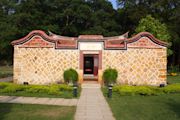搜尋結果
Kinmen (金門) means 'golden gate'. The name was first recorded in 1387 when the Hongwu Emperor appointed Zhou Dexing to administer the island and protect it from pirate attacks. The spelling "Kinmen" is a postal romanization.
Helü or Helu was king of the state of Wu [1] from 514 to 496 BC, toward the end of the Spring and Autumn period of ancient China. His given name was Guang ( Chinese: 光 ); he was initially known as Prince Guang . Life. Prince Guang was the son of King Yumei, and the nephew of King Liao. [4] .
References. Lu Prefecture (Anhui) Luzhou or Lu Prefecture was a zhou (prefecture) in imperial China centering on modern Hefei, Anhui, China. It existed (intermittently) from 581 to 1277. [3] Counties. Lu Prefecture administered the following counties ( 縣) through history:
- Origins
- Later Adoption
- Lu Clan of Fanyang
- Notable People
- Notable Korean People with The 盧 Surname
According to the Tang dynasty genealogy text Yuanhe Xing Zuan, the surname Lu 盧 originated in the State of Qi during the Spring and Autumn period, and descended from Gao Xi (高傒). Gao Xi was the grandson of Prince Gao, who was a son of Duke Wen of Qi (reigned 815–804 BC) and a descendant of Lü Shang, the founder of Qi. When the Qi ruler Wuzhi was mu...
During the Xianbei Northern Wei dynasty, Emperor Xiaowen (reigned 467–499 AD) implemented a drastic policy of sinicization, ordering his own people to adopt Chinese surnames. The Tufulu (吐伏盧) and Molu (莫盧) clans of Xianbei adopted Lu as their surname. The Xianbei people have since completely assimilated into the Han Chinese. According to the Book o...
In the fourth century BC, the throne of the Qi state was usurped by the Tian clan. Many aristocratic clans that descended from the old ruling house of Jiang (姜), including Lu, fled the state and dispersed all over China. During the Qin dynasty, the erudite Lu Ao (盧敖) settled in Fanyang Commandery (modern Beijing). The Fanyang Lu clan later became e...
Lu Wan (盧綰; 256–194 BC), Western Handynasty generalLu Zhi (盧植; died 192 AD), Eastern Handynasty politicianLu Sidao (盧思道; 531–582), Sui dynastypoetLu Chengqing (盧承慶; 595–670), Tang dynasty chancellor
















